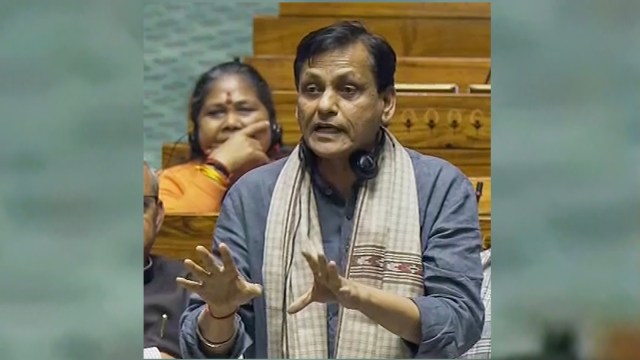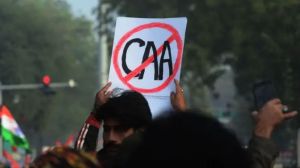Opposition was pained to see an OBC in PM’s chair: Nityanand Rai
Jammu and Kashmir Local Bodies Laws (Amendment) Bill, 2024, passed; Opposition calls it 'fiddling with demographic composition'
 MoS, Home Nityanand Rai in LS on Tuesday. (Image source: PTI)
MoS, Home Nityanand Rai in LS on Tuesday. (Image source: PTI)Piloting a bill that seeks to give Other Backward Classes in Jammu and Kashmir reservations in local bodies, Minister of State, Home, Nityanand Rai on Tuesday said the Opposition was pained to see an OBC in the Prime Minister’s chair.
The Jammu and Kashmir Local Bodies Laws (Amendment) Bill, 2024, was later passed by a voice vote. The Bill seeks to amend the Jammu and Kashmir Panchayati Raj Act, 1989, the Jammu and Kashmir Municipality Act, 2000, and Jammu and Kashmir Municipal Corporation Act, 2000, which Rai claimed do not have provision for reservations for OBCs. The Bill also provides 33% reservations to women.
“They kept saying they were supporting the Bill but they kept talking about other issues. I want to tell them that wherever they go they will hear only Modi-Modi. The Opposition is pained to see an OBC PM in the chair. In 2014, when the government was being formed, PM Modi had said in the Central Hall that our government is dedicated to the OBCs,” Rai said, while replying to the debate on the Bill.
The statement comes at a time when the Congress has made caste census a poll issue and Rahul Gandhi on Monday said that if voted to power his government would remove the 50% cap on quotas clearing the way for more reservations to the OBCs.
Replying to the Opposition charge of government skirting the caste census issue, Rai said, “As many as 27 ministers in the Modi cabinet are from OBCs, which is 35% of the total Cabinet. The Modi government gave constitutional recognition to the OBC Commission. Under All-India Quota Scheme, provision for reservation was made in MBBS and MD admissions. We have given 27% reservations to OBCs in Kendriya Vidyalaya, Navoday Vidyalaya, and Sainik schools. In the past nine years, admission of OBC students has gone up by 33%.”
Rai said that in the IITs, tuition fees of OBC students have been waived off. He then listed out the provision for reservation of OBC communities in NEET, 27% reservation for OBCs in allocation of petrol pumps and gas agencies, scheme to provide low-interest loans to OBC entrepreneurs, financial help to the tune of Rs 4,000 to over Rs 1 lakh to OBC students, among Modi government’s efforts to uplift OBC communities.
Rai also listed out multiple steps that the government had taken for the uplift of OBCs in J&K. He said Pahadis have been given 4% reservations and safai karmacharis (workers engaged in cleanliness) have been given domicile certificates. He also said 100% saturation was achieved in giving pension to old-age and specially abled people. He also said that after the revocation of Article 370, comprehensive changes have been seen in terms of security and economic development.
Participating in the debate, Leader of the Congress in Lok Sabha, Adhir Ranjan Chowdhury, said, “For the past five years there has been no elected government in J&K. Since 2014, there have been no elections there. Even panchayats remain suspended after January 9 when their tenure got over. The government has simply been fiddling with the demographic composition of J&K to score political points. They don’t conduct elections there. They don’t give it statehood.”
Chowdhury then spoke on caste census. “Our leader Rahul Gandhi has promised that caste census will be conducted and the 50% cap will be removed. When we talk about caste census, Modiji says he has no caste. They keep shedding crocodile tears on OBCs, but in Jharkhand they have tried to usurp power by sending a tribal chief minister to jail,” he said.
JKNC’s Hasanian Masoodi raised the issue of lack of people’s representation in the Union Territory.
“It was said that following August 5, 2019, decisions everything will become alright in J&K. Yesterday (Monday) in sub-zero temperature, entire Ladakh and Kargil (population) were on the roads protesting. What have we given to the nation then? We are only misleading the people. We were told militancy will be over. As many as 20 brave soldiers, including a commanding officer, have lost their lives in the past three months. J&K was made a laboratory for politics,” he said.
Arguing that these amendments should ideally be passed by the J&K Assembly, Masoodi said, “For what reason is there no representation of the people in J&K. This matter should have been discussed in the Assembly by the local people. It is shameful that the Supreme Court had to say you must conduct elections in J&K. There should be a time frame…Leave this to the Assembly. You are depriving 1.5 crore (people) of their democratic rights.”
N K Premchandran of the RSP supported Masoodi saying that the Assembly should have the right to pass such bills.
Saugata Roy of the TMC raised the issue of Chandigarh mayoral polls. “How are local body elections conducted under NDA? Yesterday, the Supreme Court said that what happened in Chandigarh is shameful. I have always said leave J&K people on their own. First, you arbitrarily created J&K and Ladakh two UTs. It is the first time that a state has been reduced to a Union Territory. We demand that elections are held in J&K. Don’t do this small tinkering. Let the Assembly do all the amendments required,” he said.
V Kalanidhi of the DMK said all must see what has happened with the reservation policy.
“There are hundreds of communities that come under OBCs. Unless we have caste census, we will not know which communities have benefited by this and which communities continue to be oppressed. Tamil Nadu was the first state to give highest reservations at 69%. We believe that proportionate reservation is necessary. We need to have reservations within the OBC reservations,” Kalanidhi said.
Kaushalendra Kumar of the JDU said the reservation for OBCs in J&K local bodies was a welcome step but reservation for women should be increased to 50%. There should be a women’s commission and an OBC commission in J&K.







